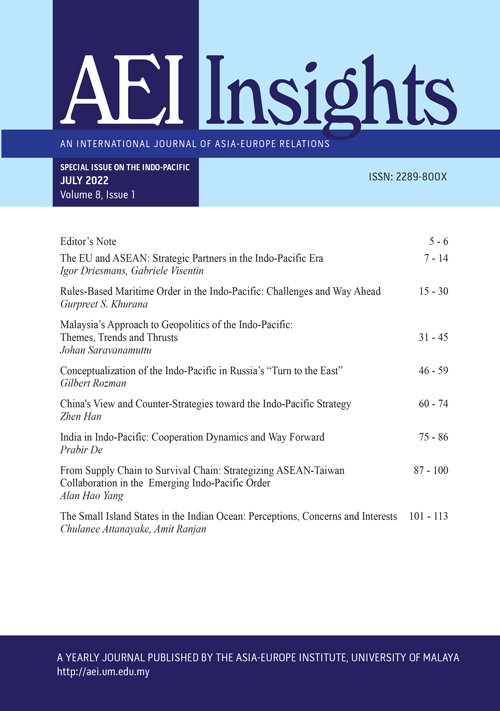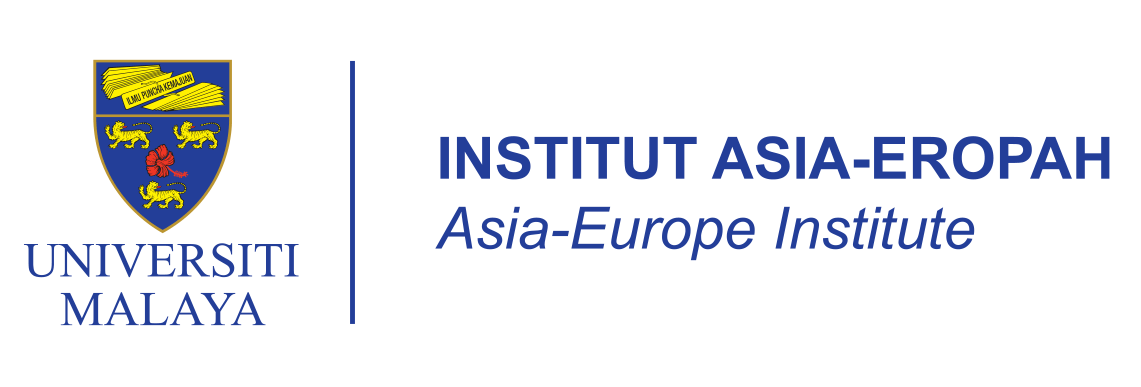
Editor-in-Chief
Distinguished Professor Dato' Dr. Rajah Rasiah, Executive Director, AEI, Universiti Malaya
Managing Editor
Dr. Rahul Mishra, Director, Centre for ASEAN Regionalism Universiti Malaya (CARUM), AEI, Universiti Malaya
Editorial Board members
Professor Emeritus Dr. Azirah Hashim, ASEM Education Standing Working Group - AEI representative, Universiti Malaya
Dr. Nurliana Binti Kamaruddin, Deputy Executive Director (Academic), AEI, Universiti Malaya
Prof. Maya Khemlani David, Honorary Professor, AEI, Universiti Malaya
Tan Sri Mohamed Jawhar Hassan, Adjunct Professor, AEI, Universiti Malaya
Tan Sri Razali Ismail, Adjunct Professor, AEI, Universiti Malaya
Prof. Johan Saravanamuttu, Adjunct Professor, AEI, Universiti Malaya
Prof. Jörn Dosch, Adjunct Professor, AEI, Universiti Malaya
Prof. Dr. Anthony Milner, Visiting Professor, AEI, Universiti Malaya
Assoc. Prof. Dr. Fumitaka Furuoka, Associate Professor, AEI, Universiti Malaya
Assoc. Prof. Dr. Roy Anthony Rogers, Associate Professor, Department of International and Strategic Studies, Faculty of Arts and Social Sciences, Universiti Malaya
Assoc Prof. Dr. Sameer Kumar, Associate Professor, AEI, Universiti Malaya
Dr. Kevin Fernandez, Senior Lecturer, Department of Public Administration, Faculty of Business and Economics, Universiti Malaya
Editorial Assistants
Akitsu Takahashi
Yanitha Meena Louis
International Advisory Board
Emeritus Professor Dwight H. Perkins, Harvard University, USA
Distinguished Professor Dr Amitav Acharya, American University, Washington D.C. USA
Emeritus Professor Ambassador (Retd.) S.D. Muni, School of International Studies, Jawaharlal Nehru University, India
Professor Dr. Thomas Risse, Senior Professor at the Cluster of Excellence "Contestations of the Liberal Script (SCRIPTS), Freie Universität Berlin, Germany
Professor Dr. Alessia Mosca, Adjunct Professor, Sciences Po Paris, France
Professor Dr. Amrita Narlikar, President, German Institute for Global and Area Studies (GIGA) and Professor of International Relations at Hamburg University, Germany
Professor Dr. Madhu Bhalla, Delhi University, and Editor, India Quarterly, India
Professor Dr. Tosh Minohara, Professor, The Graduate School of Law at Kobe University, Japan
Professor Dr. Harsh V. Pant, King’s College, London, United Kingdom
Dr. Rizal Sukma, Senior Fellow, Centre for Strategic and International Studies, Jakarta, Indonesia

AEI-Insights: An International Journal of Asia-Europe Relations,
Vol. 8, Issue 1, July 2022,
Published by the Asia-Europe Institute Universiti Malaya
ISSN: 2289-800X
© Asia-Europe Institute, Universiti Malaya
Indexed and approved by
 Malaysian Citation Index, MyCite, Malaysian Citation Centre (MCC),
Malaysian Citation Index, MyCite, Malaysian Citation Centre (MCC),
Ministry of Education, Putrajaya, Malaysia
Contact Information
Editor-in-Chief, AEI-Insights
Asia-Europe Institute (AEI)
Universiti Malaya
50603 Kuala Lumpur, Malaysia
Tel: +603 7967 4645
Fax: +603 7954 0799
Email: aei.insights@um.edu.my
Website: https://aei.um.edu.my/
COPYRIGHT. All rights reserved. No part of this journal may be reproduced, copied or transmitted, in any form or by any means, electronic, mechanical, photocopying, recording, or otherwise, without proper written permission from the publisher.
Publication Ethics guidelines: AEI-Insights journal (authors, reviewers, editors and publisher of the journal) follows the ethics guidelines as specified by COPE (Committee on Publication Ethics) – https://publicationethics.org/
Any opinion expressed in the articles are those of the authors and do not reflect that of the Asia-Europe Institute, Universiti Malaya.
Printed at The Universiti Malaya Press, Universiti Malaya, 50603, Kuala Lumpur, Malaysia.
Biographies in the order as authors’ articles appear in the journal.
Alexander G. Savelyev is the Dr. of Political Science, Primakov Institute of World Economy and International Relations, Moscow, Russian Federation.
Igor Driesmans has been the EU Ambassador to ASEAN since 2019. He was previously a Member of the Cabinet of Federica Mogherini, a High Representative of the Union for Foreign Affairs and Security Policy/Vice President of the European Commission. Ambassador Igor Driesmans has been an official of the EU since 2003. He holds a Masters degree in History from the University of Gent (Belgium).
Gabriele Visentin was appointed EU Special Envoy for the Indo-Pacific in September 2021. He has been an official of the European External Action Service since 2011, where he served as Head of the Parliamentary Affairs Division. Mr. Visentin holds a degree in law and is specialized in International and Community law.
Gurpreet S. Khurana is a Visiting Professor at the Naval War College (NWC), Goa, India. He has been a member of the Drafting Committee, Newport Manual of Law of Naval Warfare, U.S. NWC, Newport, USA. Captain Khurana is the Head, the Centre of Excellence (Indo-Pacific and China Maritime Studies), at the Maritime Warfare Centre, Naval Base, Visakhapatnam, India.
Johan Saravanamuttu is Adjunct Professor at the Asia-Europe Institute, Universiti Malaya, and Adjunct Senior Fellow, RSIS, Nanyang Technological University, Singapore. Dr. Johan Saravanamuttu obtained his Ph.D from the University of British Columbia after his M.A. from the University of British Columbia and B.S.Sc. from University of Singapore. His Area of Specialisation are Malaysian Politics & Foreign Relations, Southeast Asian Politics, Southeast Asian Regionalism, Islam and Politics in Southeast Asia.
Gilbert Rozman is the Emeritus Musgrave Professor of Sociology and the editor-in-chief of The Asan Forum, a bi-monthly, on-line journal on international relations in the Indo-Pacific region. He taught at Princeton from 1970 to 2013. His specialization is Northeast Asia—China, Japan, Russia, and South Korea—including modernization, national identities, mutual perceptions, regionalism, and strategic thinking.
Zhen Han is an Assistant Professor at the Sacred Heart University, Fairfield, Connecticut, United States. Prior to this, he was an instructor at the Political Science Department, the University of British Columbia, Canada.
Prabir De is a Professor at the Research and Information System for Developing Countries (RIS), New Delhi. Prof De is also the Coordinator of the ASEAN-India Centre (AIC) at RIS. Graduated from the Scottish Church College in Calcutta, he did his Masters in economics from the Calcutta University and Ph.D. in economics from the Jadavpur University, Calcutta.
Alan Hao Yang is Executive Director of Taiwan-Asia Exchange Foundation (TAEF). He also serves as Deputy Director of the Institute of International Relations (IIR) and Executive Director of the Center for Southeast Asian Studies (CSEAS) at National Chengchi University, Taiwan. Dr. Yang has been nominated as a senior fellow of George HW Bush Foundation for US-China Relations in the United States since 2021 and a nonresident fellow of China Desk of the Reconnaissance Research in Kuwait since the July of 2021.
Chulanee Attanayake is a Research Fellow at Institute of South Asian Studies, National University of Singapore. She obtained her PhD from Central China Normal University in Wuhan. She has a Bachelor in Arts from University of Peradeniya and a Master in Regional Development and Planning from University of Colombo, Sri Lanka.
Amit Ranjan is a Research Fellow at the Institute of South Asian Studies, National University of Singapore. His research interests include Water Disputes in South Asia, South Asian politics (India, Bangladesh, Maldives and Pakistan), Partition of India, India’s South Asia policy and India’s internal security.
Often termed as a maritime mega region in the making, the Indo-Pacific region aims to connect the Indian Ocean with the Asia-Pacific on a wide range of traditional and non-traditional frontiers of both cooperation and competition. Bringing Asian heavyweights – Japan and India- to the spotlight as the rule makers of the region, and keeping ASEAN (Association of Southeast Asian Nations) at the centre stage as the normative agency, it also strives to keep the US as the resident superpower of the region while facilitating the return of the Europe to Asia although in a more developmental-normative capacity.
While China’s response was lukewarm in the beginning, it is changing gradually especially with regard to the ASEAN’s inclusive AOIP (ASEAN Outlook on Indo- Pacific), and EU’s renewed efforts to engage the region through a range of developmental, connectivity, trade and other sectoral initiatives.
Albeit in varying degrees, major stakeholders in the region have come up with their own respective visions and strategies about how to set the Indo-Pacific region in order, what should be it defining features, the enabling components, and the intra-regional, regional, and sub-regional architectures.
To the sceptics, the Indo-Pacific also presents the danger of the US-China rivalry getting more intense, which if not managed on time, might lead to accidental war to say the least. ASEAN’s official position of “dialogue and cooperation, and not rivalry with China” has been one of the key contributors in shaping the Indo- Pacific region and keeping it away from being a strategically fierce competitive framework.
This special issue of AEI Insights examines the Indo – Pacific as a normative and strategic construct and its emergence as an artificially constructed but socially designed region. It reviews various aspects of the Indo – Pacific through multiple stakeholders’ perspectives and across multiple dimensions. This special issue covers some hitherto underdiscussed issues of importance such as Malaysia’s approach to the Indo-Pacific, Taiwan’s role in the Indo-Pacific region, role of smaller Island states of the Indian Ocean region, as also China and Russia’s response to the Indo-Pacific construct.
Issues such as the theoretical nuts and bolts of protecting and preserving the maritime component of Indo-Pacific order and connectivity are critically assessed by the thought - leaders on the subject matter. Mainstream issues such as the EU’s Indo-Pacific strategy are written from practitioners’ perspective so as to provide the readers with ideas and assessments that often remain confined in inaccessible official documents.
Curated with the aim to crack open new horizons of debates on Indo-Pacific – both as a region and a construct, this special issue strives to contribute to generating new ideas on the Indo-Pacific while also presenting as inclusive and multidimensional picture as possible both in terms of issue areas and contributors.
Dr. Rahul Mishra
Managing Editor
Director
Centre for ASEAN Regionalism Universiti Malaya (CARUM)
Asia-Europe Institute, Universiti Malaya
The EU and ASEAN: Strategic Partners in the Indo-Pacific Era ( PDF 174KB)
Igor Driesmans, Gabriele Visentin
Rules-Based Maritime Order in the Indo-Pacific: Challenges and Way Ahead ( PDF 545KB)
Gurpreet S. Khurana
Malaysia’s Approach to Geopolitics of the Indo-Pacific: Themes, Trends and Thrusts ( PDF 326KB)
Johan Saravanamuttu
Conceptualization of the Indo-Pacific in Russia’s “Turn to the East” ( PDF 343KB)
Gilbert Rozman
China's View and Counter-Strategies toward the Indo-Pacific Strategy ( PDF 207KB)
Zhen Han
India in Indo-Pacific: Cooperation Dynamics and Way Forward ( PDF 291KMB)
Prabir De
From Supply Chain to Survival Chain: Strategizing ASEAN-Taiwan Collaboration in the Emerging Indo-Pacific Order ( PDF 530KB)
Alan Hao Yang
The Small Island States in the Indian Ocean: Perceptions, Concerns and Interests ( PDF 197kB)
Chulanee Attanayake, Amit Ranjan
Last Update: 15/11/2023